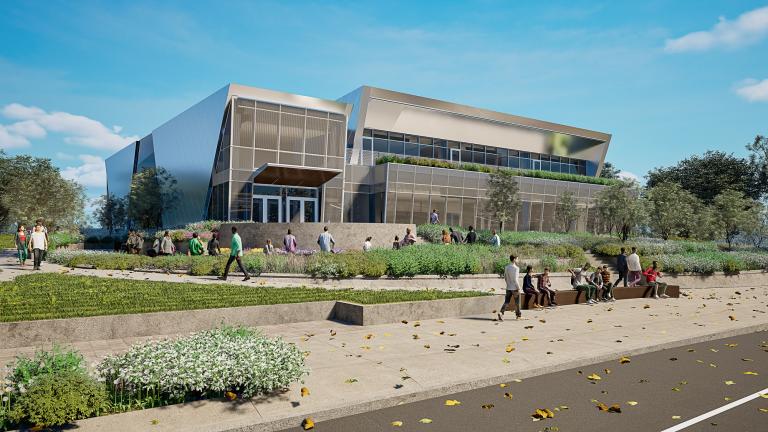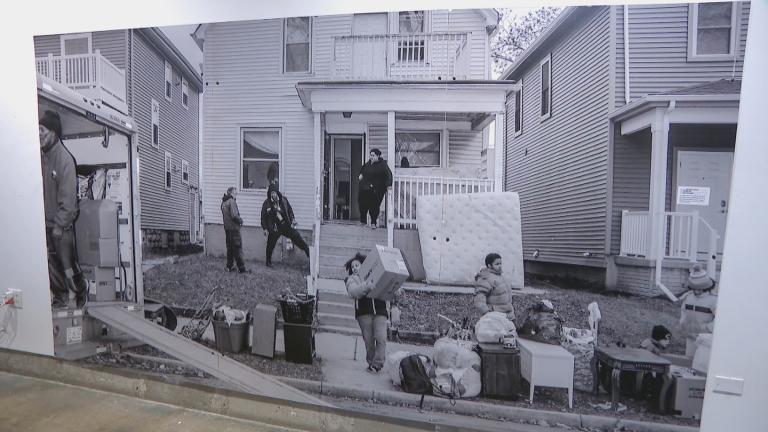 A residential street in Wicker Park in Chicago. (WTTW News)
A residential street in Wicker Park in Chicago. (WTTW News)
The end of Illinois’ ban on evictions during the COVID-19 pandemic did not trigger a long-feared tsunami of evictions in Chicago or Cook County, according to data obtained by WTTW News.
Gov. J.B. Pritzker declared a moratorium on evictions beginning in March 2020 as part of the state’s stay-at-home order designed to stop the spread of the coronavirus. The ban ended on Oct. 3, even as state officials scrambled to get millions of dollars in federal aid to those at risk of being forced out of their homes.
The number of residential and commercial evictions in Chicago and Cook County were 32% lower in October 2021 than in October 2019, according to data provided by the office of Cook County Chief Judge Tim Evans. October was the first full month with no restrictions on enforcing eviction judgements in Illinois.
However, evictions rebounded significantly in October 2021 as compared with October 2020, when the restrictions were in place as the second wave of COVID-19 swept Chicago and Illinois. Cook County judges approved only 322 evictions in October 2020, as compared with 1,866 in October 2021, according to the data.
In Chicago, 1,278 households were evicted from their homes in October 2021, along with 42 businesses, according to the data. In suburban Cook County, an additional 566 households were evicted, along with 22 businesses, according to the data.
Michael Glasser, the president of the Neighborhood Building Owners Alliance, which represents landlords, said the group was pleased a surge of evictions had not materialized and credited landlords for making “sacrifices over the course of this pandemic (that) kept people safely housed.”
However, some landlords are still struggling to collect rent from their tenants, especially those on the South and West sides and south suburbs, even as those who own rental properties downtown, North and Northwest sides and suburbs are experiencing a “strong recovery,” according to a statement from the group.
A Chicago law will require landlords seeking to evict tenants who can’t pay rent because of the financial impact of the pandemic to show proof that they tried to work out an agreement until Dec. 3, officials said. That could include applying for financial assistance from state and city programs.
Chicago residents can check the status of an application for rental assistance submitted in the summer at chicago.gov/renthelp, while those who need legal assistance can call 312-347-7600 or go to rentervention.com to reach free services offered by the Lawyers’ Committee for Better Housing.
Approximately 26,850 Chicagoans applied in May and June for $137 million in grants designed to stave off a wave of evictions and keep the lights on across Chicago, according to city officials.
However, city officials had only $80 million available in this round of assistance.
The city has sent $73.3 million to approximately 8,600 households during this round of assistance, officials said.
City officials are expected to announce an additional round of rental assistance in December.
Cook County residents served with an eviction notice can go to cookcountylegalaid.org or call 855-956-5763 to get free legal aid and mediation services.
State officials have sent $540 million in emergency rental assistance to households through the Illinois Rental Payment Program, making Illinois a national leader in the push to prevent households from being evicted during the pandemic. Since 2020, the state of Illinois has provided more than $776 million in emergency rental assistance to help keep more than 103,100 Illinois seniors, families and others safely housed, officials said.
That program will reopen Dec. 6 at illinoishousinghelp.org and accept applications through Jan. 9, officials said. That will make $250 million available, enough to help more than 27,000 Illinois families cover up to 18 months of emergency rental payments, including up to 15 months of missed payments dating back to June 2020 and up to three months of future rent payments through April 2022.
Priority will be given to households earning less than 50% of the area’s median income and to households with one or more members who have been unemployed for at least 90 days, officials said.
Contact Heather Cherone: @HeatherCherone | (773) 569-1863 | [email protected]








